9 start with P start with P
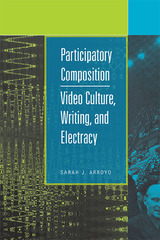
Like. Share. Comment. Subscribe. Embed. Upload. Check in. The commands of the modern online world relentlessly prompt participation and encourage collaboration, connecting people in ways not possible even five years ago. This connectedness no doubt influences college writing courses in both form and content, creating possibilities for investigating new forms of writing and student participation. In this innovative volume, Sarah J. Arroyo argues for a “participatory composition,” inspired by the culture of online video sharing and framed by theorist Gregory Ulmer’s concept of electracy.
Electracy, according to Ulmer, “is to digital media what literacy is to alphabetic writing.” Although electracy can be compared to digital literacy, it is not something shut on and off with the power buttons on computers or mobile devices. Rather, electracy encompasses the cultural, institutional, pedagogical, and ideological implications inherent in the transition from a culture of print literacy to a culture saturated with electronic media, regardless of the presence of actual machines.
Arroyo explores the apparatus of electracy in many of its manifestations while focusing on the participatory practices found in online video culture, particularly on YouTube. Chapters are devoted to questions of subjectivity, definition, authorship, and pedagogy. Utilizing theory and incorporating practical examples from YouTube, classrooms, and other social sites, Arroyo presents accessible and practical approaches for writing instruction. Additionally, she outlines the concept of participatory composition by highlighting how it manifests in online video culture, offers student examples of engagement with the concept, and advocates participatory approaches throughout the book.
Arroyo presents accessible and practical possibilities for teaching and learning that will benefit scholars of rhetoric and composition, media studies, and anyone interested in the cultural and instructional implications of the digital age.
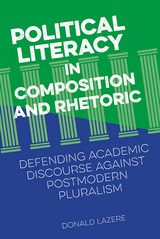
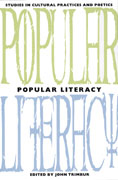
From the work of medieval spiritualist Margery Kempe and John Foxes’ Book of Martyrs to nineteenth century American scrapbooks, Mexican ex-votos, and Italian-American cookbooks, the essays in Popular Literacy examine acts of reading, writing, and speaking that take place at the margins of official, institutionalized literacy.
The contributors explore these noncanonical, unschooled, and unauthorized acts in order to explore how people make literacy popular by using whatever means of communication is at hand, to their own ends. The essays treat a range of topics, agents, and historical settings, and the contributors use a variety of theoretical frameworks and methods from a number of fields: ethnography, American studies, history, literary criticism, science studies, rhetoric, and writing studies.
The chapters examine particularly revealing historical moments and cultural conjunctures where instances of popular literacy take place in uneasy relation to the dominant institutions—the church, the state, the schools, the market. The contributors show that while the practices of popular literacy are never free from these influences, neither are they altogether encapsulated by them.
Taken as a whole, the essays are loosely aligned in a common project to study the ways ordinary (and extraordinary) readers, speakers, and writers use literacy to articulate identities and social aspirations, to produce alternative forms of cultural knowledge, and to cope with the asymmetries of power that regulate cultural life.
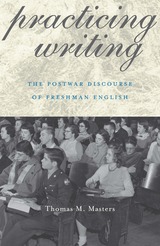
Practicing Writing examines a pivotal era in the history of the most ubiquitous-and possibly most problematic-course in North American colleges and universities: the requireAd first-year writing course generally known as “freshman English.”
Thomas Masters's focus is the mid-twentieth century, beginning with the returning waves of World War II veterans attending college on the GI Bill. He then traces the education reforms that took place in the late 1950s after the launch of Sputnik and the establishment of composition as a separate discipline in 1963. This study draws upon archives at three midwestern schools that reflect a range of higher education options: Wheaton, a small, sectarian liberal arts college; Northwestern, a large private university; and Illinois, a large public university.
Practicing Writing gives voice to those whose work is often taken for granted or forgotten in other studies of the subject: freshman English students and their instructors. Masters examines students' papers, professors' letters, and course descriptions, and draws upon interviews conducted with teachers to present the practitioners' points of view.
Unlike other studies of the subject, which have tended to focus more on the philosophy, theory, and ideology of teaching composition and rhetoric, Masters reveals freshman English to be a practice-based phenomenon with a durable ideological apparatus. By reexamining texts that had previously been considered insignificant, he reveals the substance of first-year composition courses and the reasons for their durability.
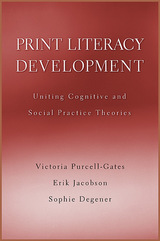
Is literacy a social and cultural practice, or a set of cognitive skills to be learned and applied? Literacy researchers, who have differed sharply on this question, will welcome this book, which is the first to address the critical divide. The authors lucidly explain how we develop our abilities to read and write and offer a unified theory of literacy development that places cognitive development within a sociocultural context of literacy practices. Drawing on research that reveals connections between literacy as it is practiced outside of school and as it is taught in school, the authors argue that students learn to read and write through the knowledge and skills that they bring with them to the classroom as well as from the ways that literacy is practiced in their own different social communities.
The authors argue that until literacy development can be understood in this broader way educators will never be able to develop truly effective literacy instruction for the broad range of sociocultural communities served by schools.
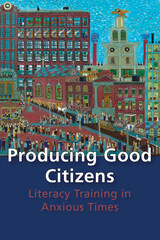
Early on, educators bore the brunt of literacy training, while also being charged with producing the right kind of citizens by imparting civic responsibility and a moral code for the workplace and society. Literacy quickly became the credential to gain legal, economic, and cultural status. In her study, Wan defines three distinct pedagogical spaces for literacy training during the 1910s and 1920s: Americanization and citizenship programs sponsored by the federal government, union-sponsored programs, and first year university writing programs. Wan also demonstrates how each literacy program had its own motivation: the federal government desired productive citizens, unions needed educated members to fight for labor reform, and university educators looked to aid social mobility.
Citing numerous literacy theorists, Wan analyzes the correlation of reading and writing skills to larger currents within American society. She shows how early literacy training coincided with the demand for laborers during the rise of mass manufacturing, while also providing an avenue to economic opportunity for immigrants. This fostered a rhetorical link between citizenship, productivity, and patriotism. Wan supplements her analysis with an examination of citizen training books, labor newspapers, factory manuals, policy documents, public deliberations on citizenship and literacy, and other materials from the period to reveal the goal and rationale behind each program.
Wan relates the enduring bond of literacy and citizenship to current times, by demonstrating the use of literacy to mitigate economic inequality, and its lasting value to a productivity-based society. Today, as in the past, educators continue to serve as an integral part of the literacy training and citizen-making process.
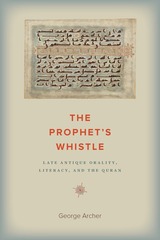
The Prophet’s Whistle is a study of the ancient, nonliterary features of the Quran, many of which are often overlooked by historians and the public. George Archer corrects this striking absence by using observations from the anthropologies of living oral cultures, the cognitive sciences of literacy, and the study of other dead oral cultures. The Prophet’s Whistle shows that the thought systems of the Quran are oral, through and through, but by the end of the life of its Prophet, the Quran likewise hints at a personal and cultural embrace of writing and the mindsets of literate people.

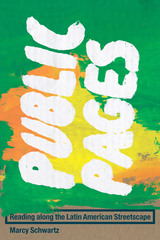
Public reading programs are flourishing in many Latin American cities in the new millennium. They defy the conception of reading as solitary and private by literally taking literature to the streets to create new communities of readers. From institutional and official to informal and spontaneous, the reading programs all use public space, distribute creative writing to a mass public, foster collective rather than individual reading, and provide access to literature in unconventional arenas.
The first international study of contemporary print culture in the Americas, Public Pages reveals how recent cultural policy and collective literary reading intervene in public space to promote social integration in cities in Colombia, Argentina, Brazil, Mexico, and Chile. Marcy Schwartz looks at broad institutional programs such as UNESCO World Book Capital campaigns and the distribution of free books on public transportation, as well as local initiatives that produce handmade books out of recycled materials (known as cartoneras) and display banned books at former military detention centers. She maps the connection between literary reading and the development of cultural citizenship in Latin America, with municipalities, cultural centers, and groups of ordinary citizens harnessing reading as an activity both social and literary. Along with other strategies for reclaiming democracy after decades of authoritarian regimes and political violence, as well as responding to neoliberal economic policies, these acts of reading collectively in public settings invite civic participation and affirm local belonging.
READERS
Browse our collection.
PUBLISHERS
See BiblioVault's publisher services.
STUDENT SERVICES
Files for college accessibility offices.
UChicago Accessibility Resources
home | accessibility | search | about | contact us
BiblioVault ® 2001 - 2024
The University of Chicago Press









